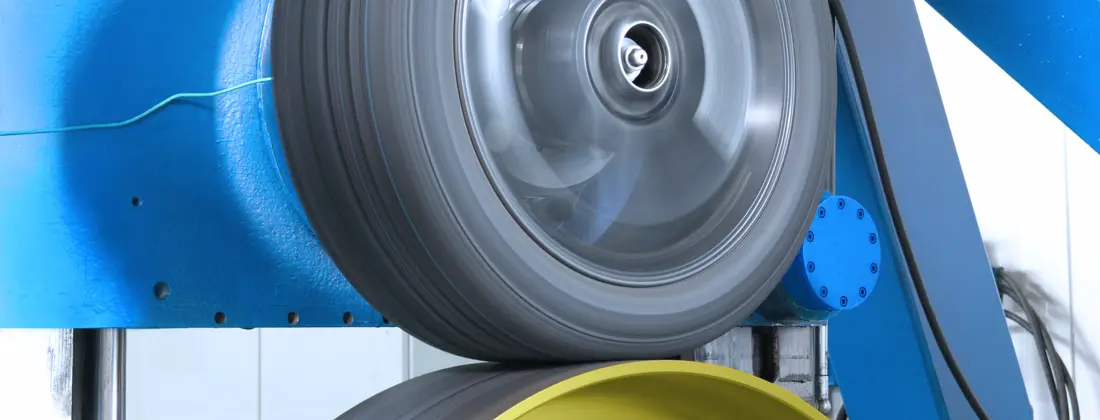JIS D4233 Tyre Rolling Resistance Test
The JIS D4233 tyre rolling resistance test is a critical component of quality assurance in the automotive testing sector. This test evaluates the rolling resistance characteristics of tyres, which are essential for fuel efficiency and overall vehicle performance. Understanding the rolling resistance helps manufacturers improve the energy efficiency of their products by minimizing frictional losses during operation.
The rolling resistance coefficient (CRC) is a key metric derived from this test, providing insights into how effectively a tyre can roll under various conditions. This parameter is crucial in meeting regulatory standards and improving customer satisfaction through enhanced fuel economy and reduced emissions.
For tyres to pass the JIS D4233 test, they must meet stringent criteria that ensure their rolling resistance falls within specified limits. These limits are designed to balance performance with environmental considerations, making them relevant for both new tyre development and existing product compliance checks.
The testing process involves placing a tyre on a specially designed machine capable of measuring the force required to roll it at a constant speed over a specific distance. This setup allows for precise measurement of the rolling resistance coefficient. The test is conducted under controlled conditions, ensuring accurate results that reflect real-world driving scenarios.
Rolling resistance testing is not only about meeting regulatory requirements; it also plays a vital role in product development and optimization. By understanding how different materials or tread patterns affect rolling resistance, manufacturers can innovate and create more efficient tyres. This knowledge helps in reducing the carbon footprint of vehicles while enhancing driving experience.
The test results from JIS D4233 are widely recognized and accepted globally, contributing to the harmonization of standards across various industries. Compliance with this standard ensures that products meet international quality benchmarks, fostering trust among customers and stakeholders alike.
In conclusion, the JIS D4233 tyre rolling resistance test is a cornerstone in ensuring high-quality tyres for automotive applications. Its importance lies in its ability to provide actionable data on product performance, driving towards greener and more efficient vehicles.
Customer Impact and Satisfaction
- Enhanced Fuel Efficiency: By ensuring tyres meet JIS D4233 criteria, manufacturers can offer products that significantly improve fuel efficiency without compromising safety or performance.
- Improved Driving Experience: Lower rolling resistance translates to smoother and more comfortable rides, enhancing customer satisfaction with the overall driving experience.
The test results provide valuable insights for both manufacturing processes and customer interactions. Quality managers and compliance officers can use these data points to make informed decisions that positively impact product development and marketing strategies.
For R&D engineers, understanding the intricacies of JIS D4233 testing allows them to innovate and refine tyre designs, leading to products that not only meet but exceed customer expectations. Procurement teams benefit from this standard by ensuring suppliers adhere to high-quality benchmarks, thus maintaining consistent product quality.
International Acceptance and Recognition
The JIS D4233 tyre rolling resistance test is widely recognized in the automotive industry for its rigorous standards. This recognition extends beyond Japan, where it was originally developed, to other countries that adopt international standards harmonized with this test.
Compliance with JIS D4233 ensures products meet global quality benchmarks, fostering trust among customers and stakeholders worldwide. The acceptance of these tests in various markets highlights the importance of consistency across different regulatory environments.
The standard’s widespread use contributes to a more harmonized approach to tyre testing and certification, promoting fair competition and better product performance across borders. This global acceptance also simplifies market entry for manufacturers who adhere to this standard.
Competitive Advantage and Market Impact
- Better Fuel Economy: Lower rolling resistance coefficients contribute to improved fuel efficiency, giving tyre brands a competitive edge in the marketplace.
- Enhanced Environmental Credentials: By reducing emissions through better tyre performance, manufacturers can position themselves as environmentally conscious leaders, appealing to eco-conscious consumers.
The JIS D4233 test is more than just a compliance requirement; it sets a benchmark for innovation and excellence in tyre manufacturing. It enables companies to differentiate their products on the market by offering superior performance and reliability.
Adhering to this standard not only meets regulatory requirements but also positions brands as leaders in sustainability and efficiency, attracting customers who prioritize these values. This competitive advantage translates into increased market share and brand loyalty.





